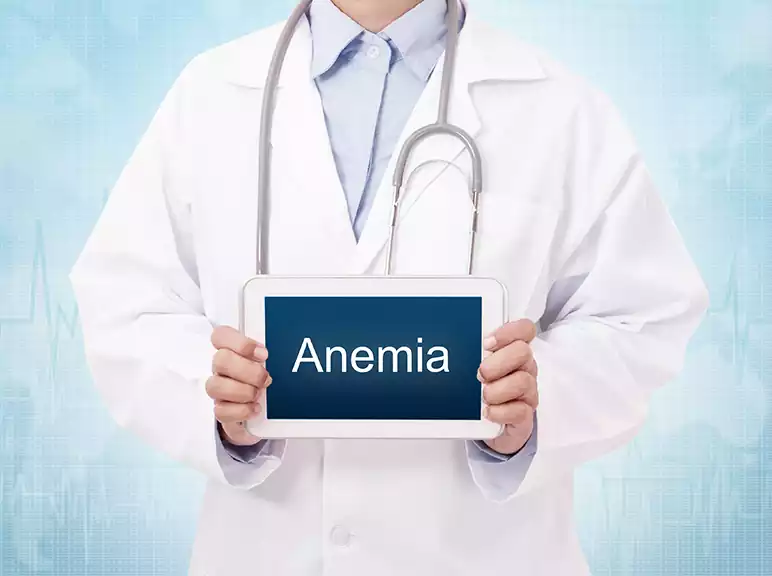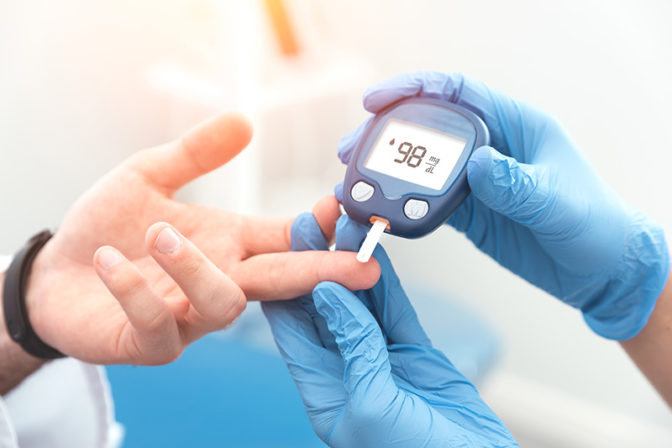Anaemia
Anaemia is a deficiency of the number or quality of red blood cells in the body. Red blood cells transport oxygen to the body using a specific protein called haemoglobin. Anaemia means either the level of red blood cells or the level of haemoglobin is lower than usual. When someone has anaemia, their heart has to work harder to pump the amount of blood required to get enough oxygen around the body. During exercise, the cells may not be able to carry enough oxygen to meet the needs of the body, and the person may become exhausted and feel ill. Anaemia is not a disease in itself, but a result of some malfunction in the body. This blood condition is common, especially in females. Some estimates suggest that about one in five menstruating women and half of all pregnant women are anaemic.
What is anaemia?
A person with anaemia does not have enough red blood cells. Your body needs these cells to transport oxygen from your lungs to the rest of your body. Anaemia is quite common. It’s often treated very easily. It can be severe, sometimes.
What causes anaemia?
The reasons why you may have anaemia:
- You’re losing too much blood.
- The body does not make the required amount of red blood cells.
- A disease or other problem that is destroying the red blood cells
Losing too much blood
It is a common cause of anaemia, especially in women who have severe bleeding during their period. It may also happen with ulcers or other problems that cause bleeding inside the body.
Not enough red blood cells
A balanced diet provides vitamins and minerals that your body needs to make up red blood cells. You may get anaemia if your food does not include enough folic acid, iron, vitamin C, and vitamin B12. A pregnant woman needs to produce extra red blood cells for a growing child. So, during pregnancy, anaemia is common. Sometimes a long-term illness keeps your body from making enough red blood cells. Examples of these include kidney disease, arthritis, diabetes, and cancer.
Destruction of too many red blood cells
Red blood cells last for almost four months. That’s why your body needs to continue to make new ones. But some problems may destroy the red blood cells sooner than that. For example, diseases such as sickle cell disease and thalassemia destroy red blood cells before they occur. And some medical treatments, such as chemotherapy, can destroy red blood cells.
Symptoms
- Pale skin
- Fatigue
- Feeling weak
- Getting tired easily
- Shortness of breath
- blood pressure drops when standing, sitting or lying position (orthostatic hypotension) – this may occur after acute blood loss, such as heavy periods.
- Frequent headache
- Racing hearts or palpitations
- Easily becoming irritated
- Difficulties in concentration
- Cracked or reddish tongue
- Appetite loss
- weird food cravings.
Diagnosis of anaemia
Depending on the cause, anaemia is diagnosed with many tests, including:
- Medical history – including regular medications and chronic illness
- Physical examination – searching for signs of anaemia and a cause of anaemia
- Blood tests – including blood count and blood iron levels, vitamin B12, folate and kidney function tests
- Urine tests – for the detection of blood in the urine
- Gastroscopy or colonoscopy – the search for signs of bleeding
- Biopsy of the bone marrow
- Faecal occult blood test – testing the blood presence of a stool (poo) sample
Treatment depends on the cause and severity of the disease, but may include:
- Vitamin and mineral supplements, if you have a deficiency.
- Iron injections – if you’re very low on iron.
- Vitamin B12 (by injection)-for pernicious anaemia
- Antibiotics – if the infection is the cause of your anaemia
- Altering the dose or regimen of regular medicines – such as anti-inflammatory drugs, if necessary
- Blood transfusions – if necessary
- Oxygen therapy – if necessary.
- Surgery to prevent abnormal bleeding, such as severe menstruation
- Spleen removal surgery (splenectomy) – in cases of severe haemolytic anaemia.
Please note: Take iron supplements only if advised by the doctor. The human body is not that good at excreting iron, and you could poison yourself if you take more than the recommended dose.
The long-term outlook for anaemic people
A person’s outlook (prognosis) depends on the cause of anaemia. For instance, if dietary deficiencies cause anaemia, the condition will be resolved by correcting the cause and using appropriate supplements for a few weeks or months. Relapses may occur, so changes in diet and, perhaps, regular supplements may be needed.
In other cases, anaemia may be permanent, and lifelong treatment may be required. Our doctor must monitor your blood regularly to ensure that your red blood cells and haemoglobin levels are adequate and to adjust your treatment if necessary.
Prevention of anaemia
Some forms of anaemia cannot be prevented because a breakdown in the cell-making process causes them. Anaemia caused by the dietary deficiency may be controlled by ensuring that you eat food from certain food groups regularly, including dairy foods, lean meats, nuts and vegetables, fresh fruits and vegetables. If you follow a vegan diet (which does not include any animal products), talk to your health care professional about the recommended vitamin and mineral supplements.








